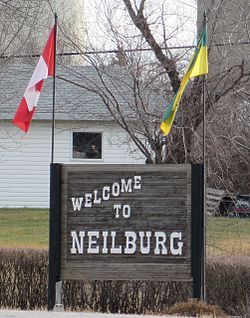Neilburg
Village of Neilburg | |
|---|---|
Village | |
 Village sign | |
| Coordinates: 52°49′59″N 109°37′59″W / 52.833°N 109.633°W | |
| Country | Canada |
| Province | Saskatchewan |
| Region | Saskatchewan |
| Census division | 13 |
| Rural Municipality | Hillsdale No. 440 |
| School Division | Northwest School Division No. 203 |
| Post office Founded | N/A |
| Incorporated (Hamlet) | 1923[1] |
| Incorporated (Village) | 1946[1] |
| Government | |
| • Mayor | Brent Wiens |
| • Deputy Mayor | Aaron Gibbons |
| • Governing body | Neilburg Village Council |
| Elevation | 677 m (2,221 ft) |
| Population (2016)[2] | |
• Total | 379 |
| Time zone | UTC−7 (MST) |
| • Summer (DST) | UTC−6 (MDT) |
| Postal code | S0M 2C0 |
| Area code | 306 |
| Highways | |
| Website | www.neilburg.ca |
| [3][4][5][6] | |
Neilburg (2016 population: 379) is a village in the Canadian province of Saskatchewan within the Rural Municipality of Hillsdale No. 440 and Census Division No. 13. A grade K–12 school is located in the village that services the Neilburg area as well as grade 7–12 students from Marsden.
Neilburg was named after an early settler, Clifford O'Neil. The first post office was in his home and was located about one mile south-east of where the village is today. Neilburg was established as a hamlet in 1923 and by 1946, it had grown big enough to be incorporated as the village of Neilburg.
The village is about 6 kilometres (3.7 mi) away from the north-east corner of Manitou Lake. On the north-west corner of the lake is Big Manitou Regional Park.
History
[edit]Neilburg incorporated as a village on January 1, 1947.[7]
In 1999, crop circles were discovered in a field near the village.[8]
Demographics
[edit]In the 2021 Census of Population conducted by Statistics Canada, Neilburg had a population of 371 living in 160 of its 192 total private dwellings, a change of -2.1% from its 2016 population of 379. With a land area of 1.24 km2 (0.48 sq mi), it had a population density of 299.2/km2 (774.9/sq mi) in 2021.[11]
In the 2016 Census of Population, the Village of Neilburg recorded a population of 379 living in 157 of its 175 total private dwellings, a -18.2% change from its 2011 population of 448. With a land area of 1.22 km2 (0.47 sq mi), it had a population density of 310.7/km2 (804.6/sq mi) in 2016.[2]
See also
[edit]References
[edit]- ^ a b Village of Neilburg, 13 June 2010
- ^ a b "Population and dwelling counts, for Canada, provinces and territories, and census subdivisions (municipalities), 2016 and 2011 censuses – 100% data (Saskatchewan)". Statistics Canada. 8 February 2017. Retrieved 30 May 2020.
- ^ National Archives, Archivia Net, Post Offices and Postmasters
- ^ Government of Saskatchewan, MRD Home, Municipal Directory System, archived from the original on 21 November 2008
- ^ Canadian Textiles Institute. (2005), CTI Determine your provincial constituency, archived from the original on 11 September 2007
- ^ Commissioner of Canada Elections, Chief Electoral Officer of Canada (2005), Elections Canada On-line, archived from the original on 21 April 2007
- ^ "Urban Municipality Incorporations". Saskatchewan Ministry of Government Relations. Archived from the original on 15 October 2014. Retrieved 1 June 2020.
- ^ Arndt, Judy. "Crop Circles - Neilburg, Saskatchewan, Canada - Sept. 1999". Treasure House Imports. Retrieved 16 February 2008.
- ^ "Saskatchewan Census Population" (PDF). Saskatchewan Bureau of Statistics. Archived from the original (PDF) on 24 September 2015. Retrieved 31 May 2020.
- ^ "Saskatchewan Census Population". Saskatchewan Bureau of Statistics. Retrieved 31 May 2020.
- ^ "Population and dwelling counts: Canada, provinces and territories, census divisions and census subdivisions (municipalities), Saskatchewan". Statistics Canada. 9 February 2022. Retrieved 1 April 2022.


